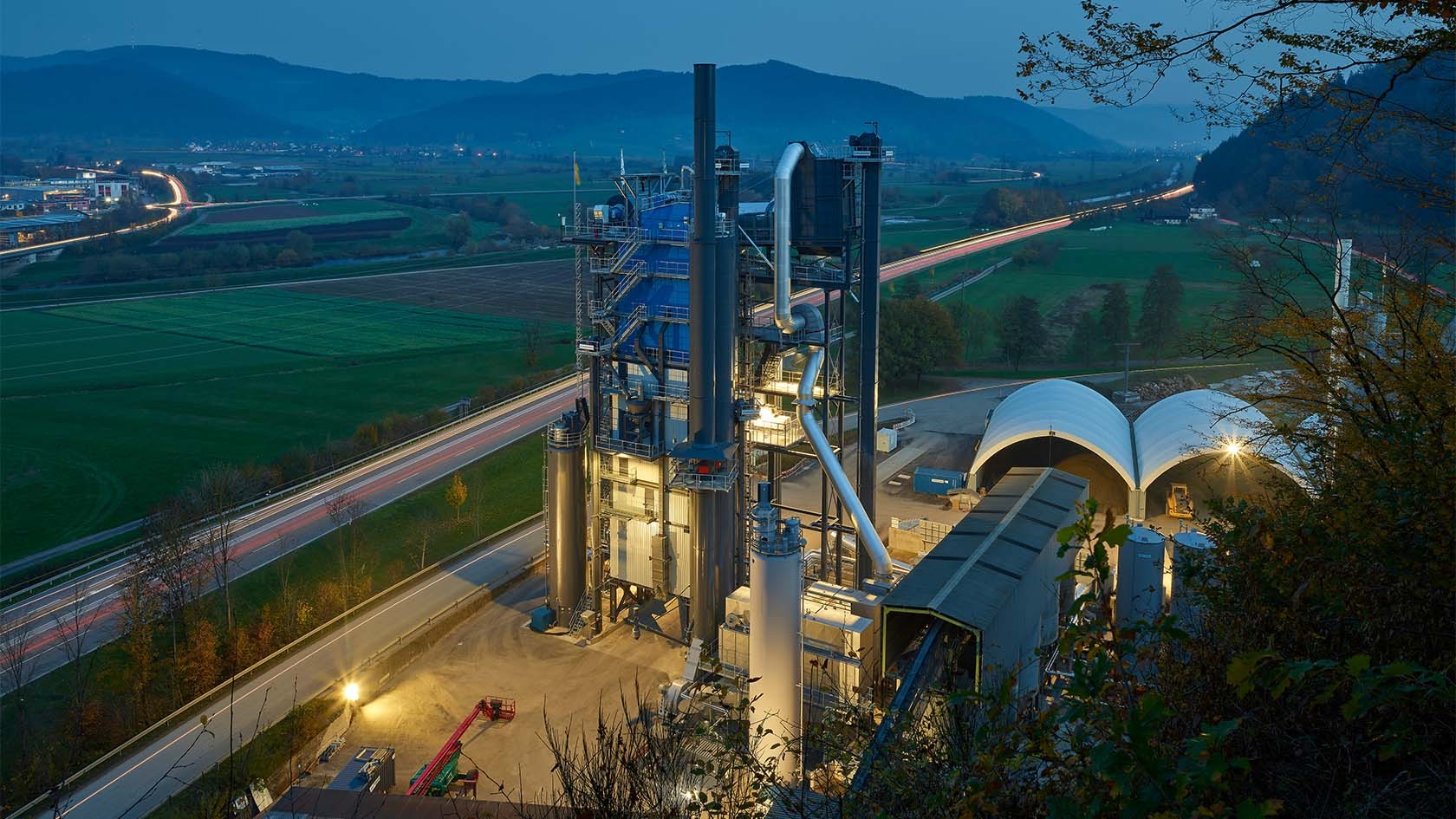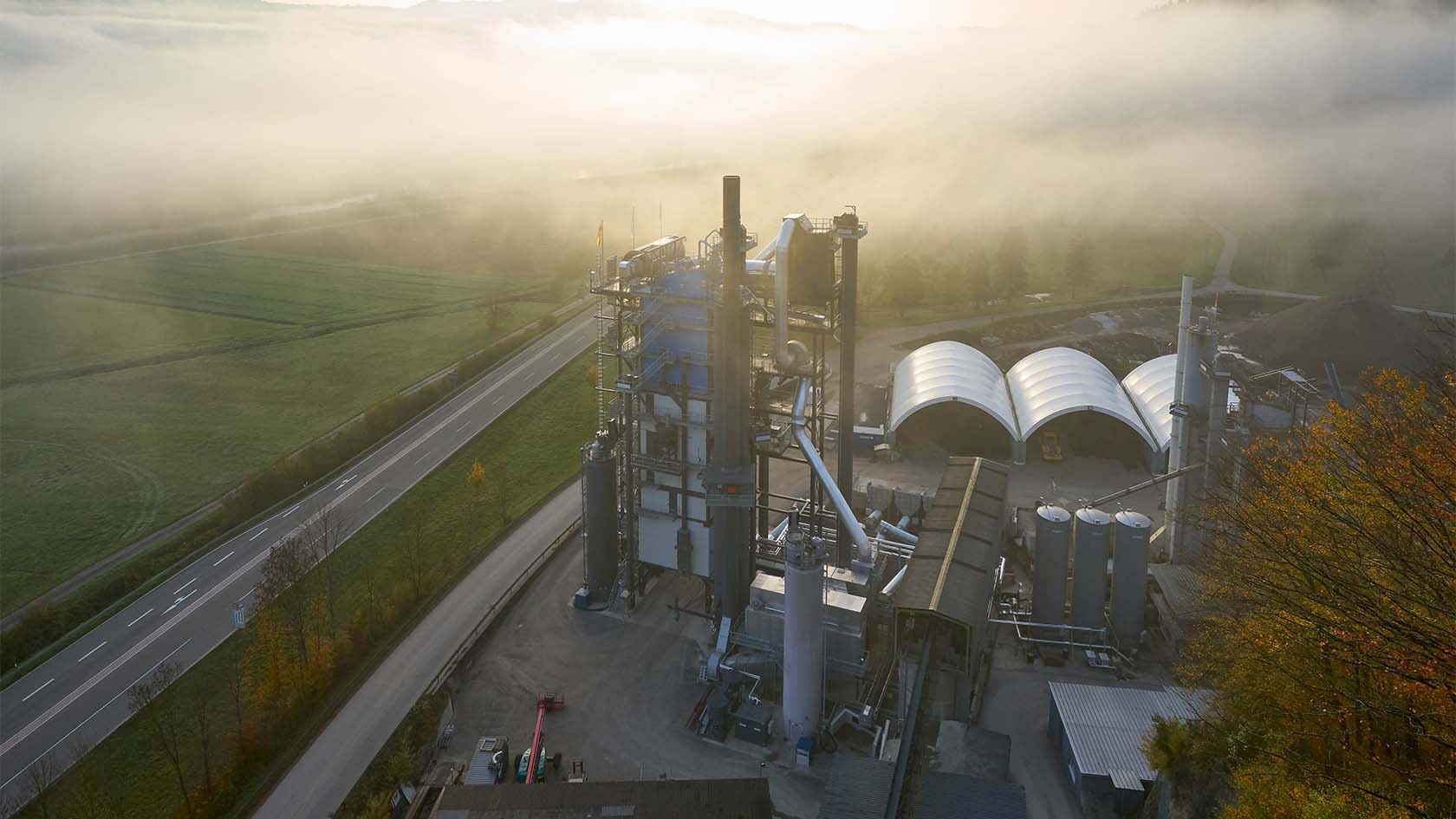Benninghoven RPP 4000 asphalt mixing plant used by Knäble


New Benninghoven RPP 4000 has already produced mixtures from 96 % reclaimed asphalt
Benninghoven designates recycling priority plants (RPP) as plants that are primarily designed for asphalt production with a high recycling content. By integrating a hot-gas generator – Benninghoven's leading recycling technology – customers can meet even the most stringent requirements for low-emission operation and produce fresh asphaltic mixture with 90 + X % reclaimed asphalt. This is more than any other recycling system on the market. With clear benefits for the operating companies, as is impressively demonstrated by an example from southern Germany.

The production process of asphalt with virgin mineral as a base is a challenging task in itself, which requires perfectly coordinated plant technology. If predominantly reclaimed asphalt and milled material are to be processed into new asphaltic mixture, however, then there really is no alternative to the Benninghoven hot-gas generator technology. This allows operating companies to turn 100 % reclaimed asphalt into new asphaltic mixture while complying with the strict specifications of the new German TA Luft standard. This has been clearly demonstrated for some time now by an RPP 4000 belonging to medium-sized construction company Knäble GmbH Straßenbau in Biberach (Baden).
Anyone driving through the Kinzig Valley in the Black Forest on Bundesstraße 33 will marvel at the sight that confronts them upon reaching the municipality of Biberach: A new, state-of-the-art Benninghoven type RPP 4000 plant, at a total height of 55 m, comes into view. The new asphalt mixing plant, which belongs to medium-sized road construction company Knäble GmbH Straßenbau from Biberach (Baden), is impressive in many ways. The RPP 4000 replaces a type TBA 3000 plant that reliably produced the asphaltic mixture for Knäble's two asphalt crews for ten years. A relatively short time period for asphalt mixing plants. Most Benninghoven plants have a life cycle of 30 to 40 years.
So why did the long-established road construction company invest in new technology rather than choosing a retrofit solution? “As it happens, our planning did start out with a retrofit. Several companies in our region have recently invested in their plants, so the market environment is very dynamic. Together with our Benninghoven contacts, we weighed up the pros and cons of various technical solutions. We concluded that we could meet our recycling, quality and capacity requirements much more effectively and sustainably by investing in new technology – and we opted for the new Benninghoven plant,” explained Nicolas Knäble, fourth-generation Managing Director. “We also opted for Benninghoven technology because, in road construction in Baden-Württemberg, there is a strong emphasis on recycling. Moreover, as a company, we aim to be resource-efficient, so it is our goal to use as little virgin mineral and bitumen as possible and to increase the proportion of reclaimed asphalt so that we can achieve the maximum possible recycling rate.”
“As a company, we aim to be resource-efficient.”
Nicolas Knäble, Managing Director Knäble GmbH Straßenbau
The Benninghoven technology consists of a recycling drum using the counterflow principle combined with a hot-gas generator: The burner fires into the hot-gas generator and intensively heats the circulating air. This hot air heats the recycling material in the recycling drum in an indirect and gentle way. The material, heated to its final temperature, enters the storage silos, from where it is fed into the mixer.
From a strategic perspective, the investment is hugely important to the medium-sized road construction company. This leading recycling technology – the Benninghoven hot-gas generator – enables 100 % reclaimed asphalt to be turned into a new asphaltic mixture. This allows Knäble to meet the requirement for maximum recycling, which means that when producing a new asphaltic mixture, as much reclaimed asphalt as is permitted by law in the state of Baden-Württemberg can be added in. “Re-using materials saves energy and makes a significant contribution to climate action”, said State Minister of Transport Winfried Hermann. The stipulation has already led to Baden-Württemberg recycling 2.5 million tonnes of asphalt in 2018 – well above the national average.
The revised TA Luft standard ("Technical Instructions on Air Quality Control") was also adopted in late 2021. “The strict limit values defined in this standard can be met using the hot-gas generator technology, and this is something that Benninghoven guarantees in all capacity ranges and even at high recycling rates,” stressed Steven Mac Nelly, Head of Research and Development at Benninghoven. “The RPP type plants are therefore ideal for Knäble's requirements.” As mentioned earlier, RPP stands for Recycling Priority Plant, which is a plant that prioritises the material flow for the recycling process and predominantly produces asphalt with higher RAP content.
“Benninghoven guarantees compliance with the strict TA Luft standard.”
Steven Mac Nelly, Head of Research and Development at Benninghoven
“As a modern company, we support the stringent legal requirements because we want to lead the way,” explained Nicolas Knäble. “It is also our goal to recycle as much asphalt as possible. And with our new plant, we have no difficulty at all in meeting the specifications. It works flawlessly with the Benninghoven technology." In terms of total carbon (TC), Knäble's RPP 4000 achieves figures that are far below the prescribed limit value. “We are delighted that the plant operates so cleanly and that we can still bring first-class asphaltic mixture to the construction site,” said Nicolas Knäble, who still sees plenty of future opportunities in asphalt recycling: “When you work with this kind of technology, each year you naturally try to increase the recycling rate and conserve even more resources.”
“It is our goal to recycle as much asphalt as possible. And with our new RPP 4000, we have no difficulty in doing just that.”
Nicolas Knäble, Managing Director Knäble GmbH Straßenbau
“We’ve already reached 96 % when producing asphaltic mixture for the base. The quality achieved is spot on,” reported Nicolas Knäble. “The days when processing reclaimed asphalt was a challenge are long gone. Instead, we now need to focus on regularly getting large milling contracts or surface course replacement construction sites in order to obtain the raw material for the recycling mix production and not run out of 'black gold'.”
Not only does the RPP 4000 integrate the sustainable hot-gas generator recycling technology, it also increases the mixing capacity. “Our new plant is an RPP 4000 with a 4 t mixer for a production capacity of 320 t/h”, said Nicolas Knäble. With the old plant, his company could only produce 240 t/h of asphalt. “This is almost equivalent to the capacity of our current hot-gas generator, which can heat 220 t/h of reclaimed asphalt and contribute this to the process.”
Ready for major projects and stocking a variety of formulations: The RPP 4000 can produce 320 t of asphaltic mixture per hour – and 440 t can be kept ready in the mixed material loading silo with four chambers.
Many other components are also designed to increase capacity and efficiency. “The RPP 4000 plant also includes two EVO JET 3 multi-fuel burners, one each for the virgin mineral dryer drum and recycling drum. Besides oil and coal dust, these burners can also burn natural gas very efficiently. In the future, this will enable Knäble to respond flexibly to market fluctuations in energy prices and always use the cheapest fuel,” said Steven Mac Nelly of Benninghoven.
An investment in the future
All in all, for Knäble this makes the new asphalt mixing plant a genuine investment in the future. The long-established family-run company from the central Black Forest region employs around 150 staff. The company's two asphalt crews process the majority of the asphaltic mixture produced on local road construction sites using Vögele feeders and pavers as well as Hamm rollers. The machinery fleet also includes a Kleemann screening plant and Wirtgen milling machines.
In just twelve days, Knäble GmbH Straßenbau replaced the binder and wearing course of a 3.2 km long section of the L 98 near Kehl. Numerous Wirtgen Group machines were used – including the recently acquired Vögele SUPER 2100-3i paver and Hamm rollers. The asphaltic mixture was, of course, produced by Knäble's new Benninghoven RPP 4000 plant.
High recycling rates with simultaneously low emissions can only be achieved using the counterflow principle combined with a hot-gas generator. Why? Since the reclaimed asphalt is heated up, added virgin mineral does not need to be overheated when it is put into the mixing process to reach the necessary temperature, which is between 140 °C and 180 °C for hot asphalt. Thus, the method saves a lot of energy as well as emissions.
The process is made possible by using the Benninghoven hot-gas generator: While the recycling material containing bitumen would “burn” with direct firing, the hot-gas generator only heats it indirectly, gently bringing it up to its optimum application temperature. At the same time, the process also pushes emissions down below the level stipulated by the TA Luft – for example, via thermal aftertreatment of most of the hydrocarbons contained in the exhaust gas stream. In the case of Knäble's plant, continuous emissions measurement at the plant's stack proves that the limit values are not exceeded at any time. “Compared to operating the old plant, our average recycling rate has increased from 25 % to 60 %”, Myriam Knäble, wife of the Managing Director, proudly reported. “And with the new technology, we’re saving 770 t of CO₂ per year compared to the old plant.”
This is an enormous advantage, particularly considering the pricing of CO₂ in Germany, the market in which Knäble operates. This is because, as of recently, energy suppliers that bring fuels (with the exception of biofuels) to the market have to purchase emission allowances, better known as CO2₂ certificates. The costs incurred increase annually and are passed on to their customers. Companies with processes that are energy-efficient and therefore low-emission and environmentally friendly will therefore have an even greater advantage in the future.
“With the new control unit, the recycling recipe generator in particular makes our work easy. It allows us to successively increase the recycling rate, and the ratio of virgin mineral and recycled material as well as the bitumen quantity are adjusted automatically.”
Nicolas Knäble, Managing Director Knäble GmbH Straßenbau
Check out the hot-gas generator now:
The leading recycling technology from Benninghoven
Find out more ...



